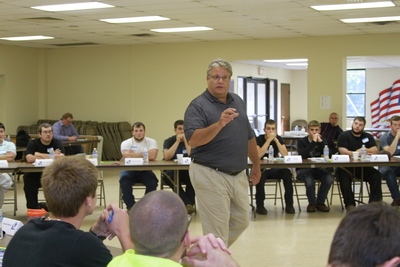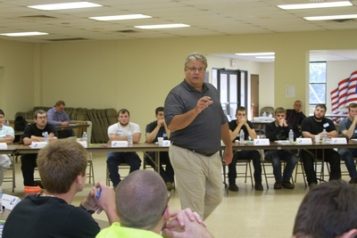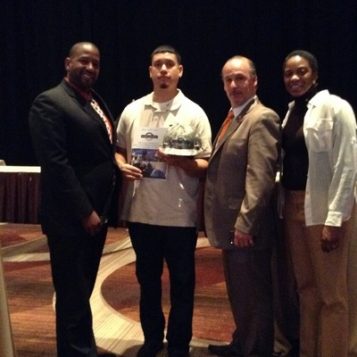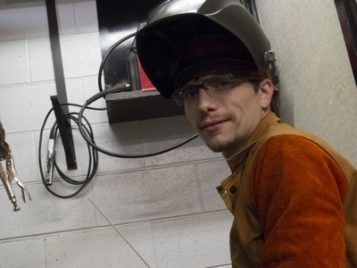
By Melissa Biernacinski
During their time in the armed forces, vets spend their careers perfecting and upholding the highest standards of conduct — discipline, dedication, respect. Skills any employer would be thrilled to have in an employee. Yet, upon honorable discharge, many vets find themselves unemployed and, in some cases, not entirely sure how to transfer skills to the civilian workforce.
According to the Bureau of Labor Statistics, the unemployment rate among Gulf War-era II (since Sept. 11, 2001) vets is 8.3 percent for males ages 18 to 44 and, for women ages 25 to 44 (18 to 24 numbers were unavailable), it’s a staggering 16.9 percent. That’s 1.53 and 11.35 percentage points, respectively, higher than their non-veteran counterparts. For the International Training Institute, the education arm of the unionized sheet metal and air conditioning industry, those numbers are unacceptable.
“Although veterans have proven work experience, dedication and discipline, they are still unemployed,” said Larry Lawrence, regional field representative/instructional development specialist for the ITI. “That doesn”t make sense to me. People with this military training and an honorable discharge should be able to work.”
To further cast its net toward the veteran pool, the ITI works together with Helmets to Hardhats, a national, nonprofit program that connects transitioning active-duty, retired and reserve military service members, as well as the National Guard, with skilled training and quality career opportunities in the construction industry. Although the organization has been helping veterans nationwide find careers in the construction trades for more than a decade, much work remains to be done.
Once veterans have determined they are interested in applying for apprenticeship at one of the 153 unionized sheet metal and air conditioning industry schools across the country, their applications are ushered to the front of the waiting line.
While the ITI actively encourages veteran recruitment and even provides marketing resources at the local level, it’s up to the individual training centers to determine the course of action for their individual markets. Sheet Metal Local No. 24 in Columbus, Ohio is one of the most supportive.
“Most veterans I meet are driven, goal-oriented people who know what they want and how they are going to get there,” said Rob Gartner, administrator/coordinator for the Columbus training center. “I like to think our program offers not only a career or job, but a brotherhood of support.”
It’s in the national standards for the ITI to give preferential standing to applicants who come to training centers through Helmets to Hardhats. A few training centers are examples of how that standard can be taken a step further.
In Pennsylvania, the sheet metal training center gives veterans direct entry into the state’s two apprentice programs that take upwards of 18 months from application to acceptance for the average civilian applicant.
“We accept the honorable discharge and say we want that kind of candidate,” said Aldo Zambetti, ITI field representative and former coordinator at the training center at Local 19 in Philadelphia. “The coordinator there is the human resources department. He can have the resume and see if someone has HVAC experience or construction experience and put them to work as long as it’s available.”
Pennsylvania veterans interested in sheet metal work — including air conditioning and heating, welding and computer-aided drafting, among others — can bypass the interview and test, enroll in the apprentice program and go straight to any available work. While all apprentices are in school, they earn a living wage while they”re in school and graduate the program free of school debt.
“The ITI has always had a great experience with Helmets to Hardhats apprentices,” Zambetti said. “I”ve not seen one dropout. I”ve never seen one person fail to graduate to be a journeyperson. I see the Helmets to Hardhats vets in their first five years at their positions, and they are holding higher level jobs, and I think it’s because of their military training.”
In Connecticut, project labor agreements are calling for a percentage of the workforce to be military veterans.
“We”re putting it in every one of our PLAs,” said David Roche, business manager at Local No. 40. “It’s helping the guys who deserve a job when they come back, and we”re getting quality workers. It’s a win-win for us all around.”
Since 2007, more than 100 workers have come to trades in the state through the school at Sheet Metal Workers Local No. 40.
“They have a work ethic. They”re used to taking direction, getting up early and going to work every day. They pay attention. They catch on quicker and they seem to excel through the program and afterwards,” Roche said. “Some of our best workers came through the military.”
Darrell Roberts, executive director for Helmets to Hardhats, was a union sheet metal worker, served in the U.S. Navy for four years and the National Guard for six. Active service members looking at an honorable discharge commonly don”t know their options. Giving the organization a call or filling out a profile on the website only helps open the lines of communication. This way, the veteran has a chance to review all opportunities and find the skilled building trades career that matches his or her background, personality and future goals in time for the discharge. The program also provides mentorship and eases the transition into civilian life.
“On one hand you”re really helping the service member,” Roberts said. “On the other hand, you”re helping the workers and contractors because you”re bringing on good workers. It’s good for everyone involved.”
As a veteran, Roberts understands the importance of stability and finding a career once the military part of life is over.
“If you”ve served active duty or the Guard, you”ve served,” he said. “You”ve served us. We don”t turn them away.”
Secretary of Labor Thomas Perez, who recently toured the Sheet Metal Local No. 17 training center in Boston, Massachusetts, sounded a similar theme. “Hiring former military isn”t charity. It’s enlightened self-interest. It’s a way to show folks who have done things for us that we have their backs.”
For more information, visit www.sheetmetal-iti.org.
Melissa Rothermel Biernacinski is director of media relations for Imagine Communications. She earned her bachelor’s degree in journalism and media studies from the University of Nevada, Las Vegas and is a graduate of the NEW Leadership Nevada — an annual program hosted at UNLV for Nevada’s upcoming women leaders.






 Join our thriving community of 70,000+ superintendents and trade professionals on LinkedIn!
Join our thriving community of 70,000+ superintendents and trade professionals on LinkedIn! Search our job board for your next opportunity, or post an opening within your company.
Search our job board for your next opportunity, or post an opening within your company. Subscribe to our monthly
Construction Superintendent eNewsletter and stay current.
Subscribe to our monthly
Construction Superintendent eNewsletter and stay current.